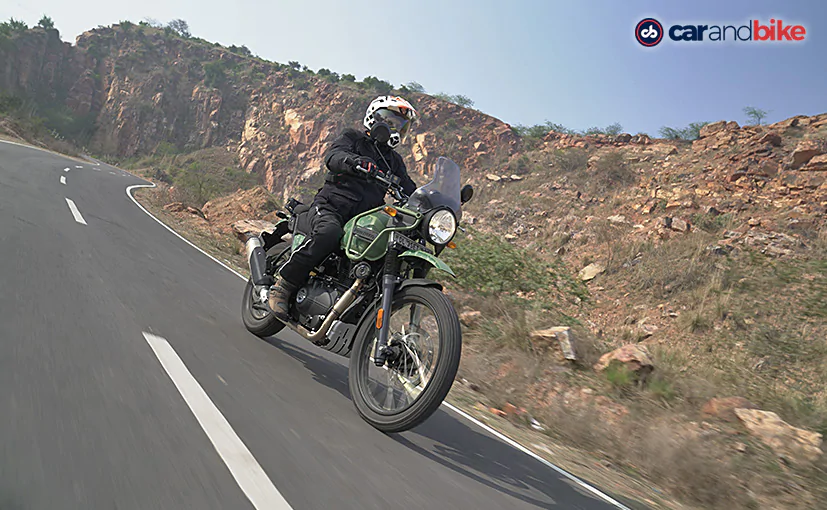2021 Royal Enfield Himalayan Review

[ad_1]
The Royal Enfield Himalayan sits at a unique place in the adventure touring segment. Built as a simple, go-anywhere, comfortable touring machine, which can take a lot of beating, the 2021 updates seem to have been done keeping in mind riders’ feedback, and practicality. So, even if there are no mechanical changes to the engine, Royal Enfield has given the 2021 Himalayan some added features to give it fresh appeal, as well as new colours. And even though it’s a tad heavy for gnarly trails, it still feels solid, stable and will go anywhere you point it at. We spent some time with the new RE Himalayan and begin falling for its old-world charm.
Also Read: 2021 Royal Enfield Himalayan Launched At ₹ 2.01 Lakh
The overall silhouette, shape and dimensions remain the same, as do the mechanicals on the 2021 Himalayan
Design
As mentioned before, the updates are mainly cosmetic, including new colours, and centred around adding better ergonomics, and comfort. While the overall silhouette and design of the 2021 Himalayan remain the same, there are some subtle changes, including three new colours. At first glance, the Pine Green colour of our test bike looks attractive and interesting, but this unique shade loses its novelty soon. I doubt if it will be my choice of colour from an ownership point of view.

The windscreen is tinted, with a broader base, more height, and the headlight bezel is now blacked out

There are no changes to the dimensions, cycle parts or seat height of the Himalayan. It still gets 220 mm ground clearance, and comes with a kerb weight of 199 kg, and gets 41 mm telescopic front forks with 200 mm travel, and a monoshock with 180 mm of travel. A 300 mm single front disc, with two-piston floating caliper and a 240 mm rear disc with a single-piston caliper, handle braking duties. Dual-channel anti-lock braking system (ABS) is standard, and ABS can be de-activated on the rear wheel. Fuel tank capacity is 15 litres.

The front rack’s design has been changed to make it better ergonomically
Through the Make It Yours feature, either on the website, or through the Royal Enfield app, you have the option to customise the new Himalayan with different colours and accessories, including hand guards, engine guards, panniers and even a different coloured seat. These accessories do come at an added cost, but add to the overall appeal and practicality, adding engine and hand lever protection, as well as more luggage carrying capacity.
Also Read: All You Need To Know About The 2021 RE Himalayan

The instrument console now gets the additional Tripper navigation pod
Tech & Ergonomics
The most significant change to the Himalayan however, is the addition of the Tripper navigation screen, powered by Google Maps. The Tripper pod is an additional dial which shows either the time or turn-by-turn navigation, when connected through a smartphone via Bluetooth and the Royal Enfield app. To accommodate the additional Tripper dial, the bottom of the windscreen has been widened, and it comes in a tinted finish (not too dark for use after sundown) and gets slightly more height than before.

The rear luggage carrier now gets a solid metal plate, and its height has been lowered
The front rack design has been changed, apparently because it brushed against the knees of some taller riders. (I didn’t face any such problem before, but I’m just of average height, at just over 5 feet, 9 inches). The rear luggage carrier has been redesigned as well; it now has a lower height, making it easy for both riders and the pillion to swing a leg over, and also comes with a solid metal plate, with load bearing limited to 7 kg. For solo riders, it’s more than enough to pack a tail bag for a few days’ worth of essentials. Oh, there’s another change! The seat has been given slightly firmer dual density foam, which should make it more comfortable to spend longer time in the Himalayan’s saddle over a long ride.

The 411 cc BS6 engine remains the same with 24.3 bhp and 32 Nm of torque
Performance & Dynamics
Now, Royal Enfield’s latest 350 cc platform, with the new RE Meteor 350 seems to have spoiled us silly. At idle, the Himalayan doesn’t sound or feel as refined as the 350 cc Meteor. But on the go, it’s definitely a different story, compared to the BS4 version of the Himalayan. On the 2021 model, there are no mechanical changes from the BS6 version introduced a year ago. With just 24.3 bhp kicking in at 6,500 rpm and 32 Nm of peak torque at 4000-4500 rpm, the figures are modest, at least on paper. But out in the real world, figures tell a different story.

The Royal Enfield Himalayan is happiest cruising at 90-100 kmph on the highway
The engine feels more or less smooth within the power band, and only protests with vibrations at over 7,000 rpm. For day-to-day use, you won’t need to rev the engine that high. Between 90-110 kmph is the Himalayan’s sweet spot, and it will cruise sweetly all day long at those speeds, and will go up to over 120 kmph if prodded. But chasing any kinds of speed over that will result in some protest in the form of vibrations. Possibly a lighter rider will see close to 130 kmph, but with my 75 kg body weight, I just about managed to touch 125 kmph, but the bike definitely felt happiest around the 100 kmph mark.

The Himalayan sails over broken trails, and the long travel suspension is a boon, despite the 199 kg kerb weight
The 5-speed transmission feels adequate, but I did miss an overdrive 6th on some occasions, which would have probably made the Himalayan feel a little more relaxed out on the highway. Overall, the mid-range has enough meat, to tackle traffic, as well as the occasional off-road excursion. Yes, it’s still heavy at 199 kg, but the low seat height will be a boon for off-road newbies, and it just tramples over rocky terrain like nobody’s business.

The Himalayan is no agile dual-sport, but it makes up for it by being a versatile adventure tourer
For experienced riders looking for some more off-road excitement, the lack of power does become apparent, as does the hefty weight of 199 kg. But despite the weight, the bike feels agile, and easy to handle. The riding position is also comfortable, whether negotiating traffic in the city, out on the highway, or tackling some off-road terrain. What is a bit of a dampener is front brake feel and bite; the front brake lever requires a tighter squeeze than you’re normally used to, but it works all right. Ride quality is great, and it’s like a big, burly SUV that gobbles up potholes and broken roads without a whimper.

The most significant change is the introduction of the Tripper navigation
Prices
With the introduction of the Tripper navigation pod, as well as small ergonomic and cosmetic changes, Royal Enfield has also revised the prices of the Himalayan. New prices start at ₹ 2.01 lakh (Ex-showroom) for the older colours, as well as the Mirage Silver colour shade, a difference of around ₹ 10,000. But for the Pine Green and Granite Black colour options, pricing is at ₹ 2.09 lakh (Ex-showroom). Yes, you do get the Tripper navigation, and even at that price, the Himalayan is very good value as a do-it-all motorcycle.

Slight more power, less weight, would have certainly made the Himalayan even more likeable
Verdict
The Royal Enfield Himalayan definitely is a good bike, and the more time you spend time with it, the more you begin appreciating it. Sure, it has its weaknesses, and more power, less weight, better brakes et al, would have worked wonders to make it even better. But eventually, what matters is that it’s a simple motorcycle that will charm you with its simplicity, whether you’re the city commuter, relaxed highway cruiser, or trudging along broken trails.

The front brake lever needs a tight squeeze, but the brakes work well to rein in the Himalayan from speed
Yes, the Himalayan still has its weaknesses. The instrument console is rather busy; the compass still seems to have a mind of its own, the ambient temperature gauge was showing 38 degrees Celsius on a pleasant February afternoon when the maximum temperature was just about 27 degrees. And as for the Tripper; it sometimes shows the perfect route, and on a couple of occasions, it will make you go absolutely ballistic! On one occasion, when I tried to follow it religiously, it took me under a flyover instead of over it, and made me sit at a red light for well over three minutes. And unless you’re in a tearing hurry to get anywhere, it will cruise easy at 100 kmph on the highway.

As a do-it-all motorcycle, the Himalayan offers superb value and versatility
Would I recommend one? I think, certainly, yes! In fact, after I returned the test bike, I was yearning to get some more saddle time with the new Himalayan, just to experience what it feels like over a longer period as a daily companion. As a do-it-all motorcycle, which will cost south of ₹ 2.5 lakhs, the Himalayan definitely ticks all the right boxes, as an all-round, likeable, and charming, entry-level ADV!
0 Comments
(Photography: Prashant Chaudhary)
For the latest auto news and reviews, follow carandbike.com on Twitter, Facebook, and subscribe to our YouTube channel.
[ad_2]
Source link


